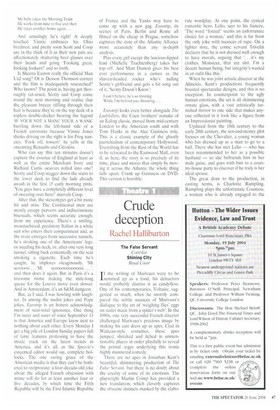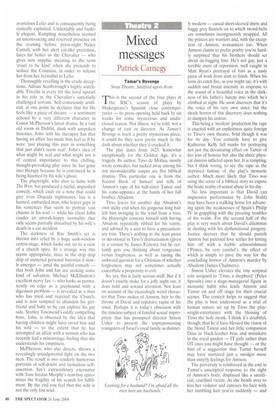Crude deception
Rachel Halliburton
The False Servant Conestoe Shining City Royal Court
If the writing of Marivaux were to be summed up as a food, his detractors would probably dismiss it as candyfloss. One of his contemporaries. Voltaire, suggested as much, when he snottily compared the subtle nuances of Marivaux's dialogue to the art of 'weighing flies' eggs on scales made from a spider's web'. In the 1980s, one very successful French director challenged Marivaux's precious image by making his cast dress up as apes. Clad in Watteau-style costumes, these apes jumped, shrieked and itched in unmentionable places in order playfully to reveal the primal urges underlying this ironic highly mannered comedy.
There are no apes in Jonathan Kent's beautiful, shimmering production of The I False Servant, but there is no doubt about 1 the crudity of some of its emotions. The playwright Martin Crimp has provided a new translation, which cleverly captures the obscene instincts masked by the elabo rate wordplay. At one point, the cynical romantic hero. Lelio, says to his fiancée, 'The word "forced" seems an unfortunate choice for a woman,' and this is far from the only joke with nuances of rape. On a lighter note, the comic servant Trivelin declares that he is not dressed well enough to have morals, arguing that it's my clothes, Monsieur, that are shit. I'm a decent human being, but integrity's wasted in an oufit like this.'
When he was joint artistic director at the Almeida, Kent's productions frequently boasted spectacular designs, and this is no exception. In counterpoint to the ugly human emotions, the set is all shimmering ornate glass, with a vast artistically tarnished mirror to one side that makes anyone reflected in it look like a figure from an Impressionist painting.
Updated from the 18th century to the early 20th century, the sex-and-money plot focuses on the Chevalier, a young woman who has dressed up as a man to go to a ball. There she has met Lelio — who has been recommended to her as a possible husband — so she befriends him in her male guise, and goes with him to a country-house party to discover if he truly is her ideal spouse.
The great draw to the production, in casting terms, is Charlotte Rampling. Rarnpling plays the unfortunate Countess, a woman who is already engaged to the avaricious Lelio and is consequently being cynically exploited. Undeniably and huskily elegant, Rampling nonetheless seemed an unconvincing and reserved presence on the evening before press-night. Nancy Carroll, with her alert cat-like prettiness, fares far better as the Chevalier — who gives new sapphic meaning to the term 'cruel to be kind' when she pretends to seduce the Countess, in order to release her from her betrothal to Lelio.
Thoroughly revelling in the crude deceptions, Adrian Scarborough's highly watchable Trivelin is every bit the lewd upstart in his role as the Chevalier's sartorially challenged servant. Self-consciously artificial, at one point he declares that his life feels like a piece of theatre a sentiment echoed by a very different character in Conor McPherson's latest drama. In a vast old room in Dublin, dank with unspoken histories, John tells his therapist Ian that having an affair has made him feel as if he were 'just playing this part in something that just didn't seem real'. John's idea of what might be real and what might not is of central importance to this chilling, thought-provoking play since he has gone into therapy because he is convinced he is being haunted by his wife's ghost.
The playwright, who shot to fame with The Weir. has produced a rueful, anguished comedy, which ends on a note that could give even Dracula nightmares. Ian is a hunted, embattled man, who leaves gaps in his sentences that seem to portray vast chasms in his soul — while his client John exudes an anorak-happy normality that only seems partially disturbed by his wife's death in a car accident.
The darkness of Rae Smith's set is thrown into relief by a huge sash-window centre-stage, which looks out on to a view of a church spire. In a strange way this seems appropriate, since in the drip drip drip of stuttered personal histories it slowly emerges — amid the painful comedy — that both John and Ian are seeking some kind of salvation. Michael McElhatton's excellent nervy Ian — who looks as permanently on edge as a greyhound with a digestion problem — is revealed as a man who has tried and rejected the Church, and is now tempted to abandon his girlfriend and baby so he can explore his gay side. Stanley Townsend's oddly compelling bore, John, is obsessed by the idea that having children might have saved him and his wife — to the extent that he has attempted an affair with a woman who has recently had a miscarriage, feeling that she understands his emptiness.
McPherson, who also directs, throws a revealingly unjudgmental light on the two men. The result is two tenderly humorous portraits of self-doubt and tremulous selfassertion. Ian's extraordinary encounter with Tom Jordan Murphy's rent-boy epitomises the fragility of his search for fulfilment. By the end you feel that the wife is not the only lost soul.



































































 Previous page
Previous page